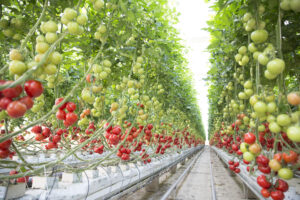At Q-Point, we prioritise knowledge and capacity building through cooperation between the public and private sectors. By establishing knowledge groups within Q-Point and forming strategic collaborations with educational institutions, consultancy firms and other private sector parties, we deliver comprehensive services to our clients in various fields. Our consultants closely align with the preferences and needs of our clients.
In recent years, Q-Point has successfully executed projects for various organisations, including RVO, COLEAD, Nuffic, Hand in Hand, and IFC/World Bank.
Value chain management
Value chain management focuses on enhancing cooperation between different entities within the supply chain. Process optimisation leads to quality enhancement, cost reduction, waste minimisation and better customer service.
Within value chain management, our consultants focus on efficient organisation, coordination and optimisation of business processes throughout the value chain, from producer to end user. Our expertise encompasses food safety, quality assurance and sustainability challenges. We advise on matters related to tracking & tracing, agro-logistics, marketing, concept development and value chain collaboration.
Our team consists of experienced consultants and trainers who have developed various tools over the years to improve performance within the value chain and mitigate losses. Our consultants operate in national and international supply chain projects in both the horticultural and animal sectors.
Urban and regenerative agriculture
Urban agriculture
By 2050, the world’s population is estimated to reach 10 billion, with more than 70% living in urban areas. Urban agriculture plays a key role in providing sufficient and nutritious food for the urban population.
Urban agriculture is an integral part of creating healthy and liveable cities. Urban farms optimise land use and offer several additional benefits such as reduced carbon emission and pollution from food transportation. It also fosters local job creation and promotes healthy and sustainable food production.
Urban agriculture offers a tangible approach to locally address the climate crisis and meet the United Nations’ sustainability objectives for this decade. This includes food security, natural resource management, soil revitalisation, meeting local cooling needs and resource recycling through community empowerment.
Regenerative agriculture
Conventional agriculture has adversely impacted climate, biodiversity, soil and water quality in many regions over the past decades.
Regenerative agriculture aims to positively contribute to nature, environment, climate and food security and improve social conditions. It focuses on restoring natural ecosystems and fostering healthy soil to promote plant growth and maintain a proper water balance. Therefore, regenerative agriculture can enhance climate resilience in the future.
Our consultants assist businesses and educational institutions in both urban and regenerative agricultural development. Nationally and internationally, we offer curriculum, course and training development. We focus on capacity building of farmers, farmer associations and agricultural educational institutions.
Value addition
Value addition entails the transformation of raw materials into high-quality finished products. In the food sector, value addition is achieved by improving food quality, taste, safety and hygiene. This results in products with extended shelf-life, increased nutritional value, improved taste and texture, higher yields and compliance with international standards.
Value addition serves as the basis of agricultural development. Local requirements, environmental factors and the dynamic nature of the value chain pose varying challenges, solutions and opportunities. Ever since Q-Point was founded, we have navigated organisations through the complexities of value addition.
Our expertise spans the horticulture and animal sectors. We provide guidance in product development and enhancement in taste, sustainability, packaging, food safety, quality management and organisational improvement. Additionally, we offer tailor-made and practical training programmes.
Farm Management
Successful agricultural business management requires making various processes transparent and manageable. Adopting environmentally and animal-friendly production methods is essential to meet consumer expectations. In recent years, Q-Point has developed several practical training programmes aimed at enhancing the knowledge and skills of entrepreneurial (SME) farmers, utilising various tools.
CowSignals®
CowSignals® was developed to provide dairy farmers with a hands-on approach to optimise animal welfare and production processes in a financially viable way. Key topics such as hygienic milking, fertility management, animal health, housing and nutrition are covered. Additionally, economic efficiency is addressed using a simple tool to calculate production costs and farm income. Optionally, a dairy processing module can be incorporated into this training if desired.
Poultry Signals®.
Poultry Signals® was developed to provide poultry farmers with a hands-on approach to optimise animal welfare and production processes in a financially viable manner. Key topics such as biosecurity, animal health, housing, nutrition, and feed efficiency are covered. Additionally, economic efficiency is addressed using a simple tool to calculate production costs and farm income.
Our experienced consultants and trainers provide guidance and training programmes internationally, particularly in emerging economies across Africa, Eastern Europe, and Southeast Asia, aimed at the optimisation of farm performance.
Postharvest management
Challenges such as insect and pest infestation, fungal growth and spoilage can be prevented by carefully managing crops. An effective postharvest management system is essential in minimising postharvest losses. This challenge requires farmer, processor and trader coordination to act food-safe, maintain food quality and reduce losses.
Understanding the factors influencing postharvest quality deterioration is crucial in establishing Good Agricultural Practices. Data collection and monitoring of harvested produce play a pivotal role in analysing the effectiveness and possible improvements of existing systems.
Our approach to establishing a postharvest management system focuses on the entire value chain. Depending on your value chain requirements, the quality parameters expected by your customers may differ from the methods used within your company. Our consultants assist in developing customised strategies for postharvest innovation, data collection and analysis, processing and value addition for perishable crops.
Gender inclusivity and mainstreaming
In the domain of gender inclusivity and mainstreaming, we organise various activities, mainly in Africa and Southeast Asia.
To promote gender equality, our consultants organise awareness sessions focused on the economic challenges faced by women. We analyse issues such as unpaid care responsibilities, limited mobility possibilities, restricted autonomy and compromised access to information. We aim to identify how these challenges can be avoided and highlight the economic significance of stakeholder support.
Our consultants conduct gender and inclusion assessments within organisations through data collection. We determine the starting points for improvement and develop a step-by-step strategy with an implementation action plan. We also support incubation programmes focused on integrating gender inclusivity norms into innovation, marketing and entrepreneurship. Additionally, we analyse shifts in self-employment and gender equality within the changing labour market.
By training stakeholders and educational institutions in integrating inclusive gender perspectives in practice and in value chain improvement, we can create socially responsible enterprises with a robust reputation.
Agro business development and entrepreneurship
Entrepreneurship serves as the foundation for fostering innovation, job creation and addressing global challenges. Business incubation is essential for individuals, organisations, communities and countries in the agricultural sector to contribute to society. There is a growing need for skill and competency development to match the needs of the labour market and create a successful business.
Expert coaching and mentoring in the field of business incubation play an important role. In incubation centres, aspiring entrepreneurs can develop business initiatives under the guidance of experts. This way, startups can catalyse local economic growth and the success of spin-offs is accelerated.
For more than 10 years, our consultants have been actively involved in establishing incubation centres in cooperation with various knowledge and educational institutions. Due to our extensive international experience in the private sector, we are aware of the challenges and opportunities in entrepreneurship and business incubation, particularly in East Africa.
Our consultants offer guidance in establishing and managing incubation centres, drafting business plans, mentoring startups, business coaching from a private sector perspective, design and systems thinking, financial assistance and facilitating training opportunities.
We have successfully collaborated with international partners such as the incubation centre for Egerton University in Kenya, the incubation centre for the Polytechnic ISPG in Mozambique, Rwanda University and Hawassa University.
Project management
The success of a project is dependent on effective project management, centred on achieving objectives within the predefined budget and time frame.
Our consultants possess the necessary skills to collaborate closely with clients in establishing the project structure and team and fulfilling financial reporting requirements. Our project managers strive for successful project execution within your organisation. We are experienced in substantively leading and managing complex projects, both nationally and internationally,
Data strategy
In modern food supply chains, reliable data is crucial for making informed decisions about production, distribution, and market positioning. By gaining insights into market demand, product quality, and logistical challenges, businesses can better anticipate opportunities and mitigate risks. However, collecting and sharing data remains a significant challenge—datasets are often unavailable, of poor quality, or withheld due to limited mutual trust. This not only hinders innovation but also affects the efficiency and resilience of the entire supply chain.
As Q-Point, we have recently carried out various projects to support businesses and industry organizations in developing data-driven strategies. One example is our project for the National Horticulture Taskforce in Kenya, where we worked closely with key stakeholders to develop a clear data strategy. This included an implementation plan that defined responsibilities for collecting, managing, and utilizing specific data. Initiatives like these not only enhance transparency and data accessibility but also foster trust within the sector.
The growing demand for structured data projects highlights the need for partners who can help establish robust systems for data collection and analysis. Q-Point is well-positioned to play a role in this, working alongside public and private partners across the supply chain to create reliable information systems. Our ultimate goal is to enable organizations to make targeted, data-driven decisions that contribute to a resilient and sustainable agri-food sector.
Quality systems, food safety and traceability
A quality management system serves as an instrument for companies to enhance quality and optimise processes. It provides guidance and structure, enabling companies to analyse problems in a process-oriented way and establish appropriate control measures.
In the export market, particularly towards the EU, retailers mandate suppliers to be certified according to food safety and/or quality systems such as BRC, IFS or FSSC 22000. Understanding the similarities, differences and trade-offs among these systems is crucial in making informed and strategic choices.
Our consultants assist in identifying food safety risks and implementing tailored solutions that can easily be integrated into your current operations. Furthermore, we establish traceability systems to enable quick product recalls and facilitate valuable information collection methods for efficiency improvements.
Healthy nutrition
Agriculture focused on healthy nutrition promotes food with sufficient nutritional value, integrating interventions enhancing nutritional value and yield. Nutrition-conscious agriculture is crucial in combating chronic malnutrition, enabling the cultivation of crops that contribute to improved nutrition and increased income.
Our consultants consider several aspects when addressing nutrition challenges. Food variety plays an important role in nutritious diets. Tailoring crop choices to the local context depends on the variety of crops already prevalent in the region that are easily cultivatable, ensuring sufficient income. We also assess the prevailing power dynamics influencing differences in dietary intake between men and women. Additionally, we analyse food processing and preservation processes as techniques to extend shelf-life and minimise nutritional losses.
To achieve these objectives, we use behaviour-changing techniques, implementing gradual interventions within local communities for behaviour changes.









